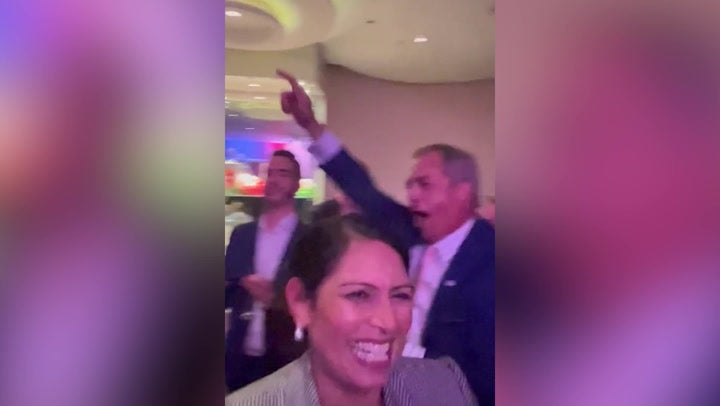Nigel Farage is the ghost at the Conservative Party feast – but he’ll do more than haunt Rishi Sunak
The former Ukip leader was welcomed in Manchester like a conquering hero, writes John Rentoul. His reception shows large parts of the Tory party have given up on the election and are looking forward to an ideological civil war


A long time ago, I made the mistake of thinking that Nigel Farage would fade away and be forgotten. Instead, he was instrumental in taking Britain out of the European Union – at two points in particular: in putting pressure on David Cameron to concede a referendum, and later in launching the Brexit Party, which contributed to the constitutional crisis that forced the election that broke the parliamentary deadlock.
After that, though, it really was time for him to step away from politics, I thought. He said so himself. He went into the YouTube business, making videos expressing opinions about how badly Brexit was being handled, but also other things. When coronavirus struck, he initially demanded more severe lockdowns – until the libertarian cause prevailed over his part of the political spectrum.
He was still fighting the Brexit cause, although public opinion was moving away from him. Before he could slip into either obscurity or the netherworld of Russell-Brand-style conspiracy theory, though, he was back again as a presenter on GB News. It is not the same as guiding the destiny of the nation, but it is a platform. What is more, GB News has journalists’ passes to the Conservative Party conference, so Farage turned up at Manchester – like a ghost at the feast.
Tim Montgomerie, the Tory activist and commentator, walked into the convention centre with him. “He got quite the reception,” Montgomerie reported. “I’m convinced party members would choose him as leader if they could.” Later, Montgomerie told The Independent that he had been surprised by how many people came up to Farage to shake his hand while they were queueing for Liz Truss’s “Make Britain Grow Again” event: “It was like being with Boris.”
Judging by the video footage of Farage at the GB News party on Monday night, singing karaoke songs with Priti Patel, with Liz Truss joining in, Montgomerie has a point. Many grassroots activists would like someone like Farage as leader – not him as such, some of them say if asked, but someone with his politics and his communication skills.
I had better be careful, with my record, making sweeping predictions about Farage’s future, but I don’t think it is going to happen. He would have to rejoin the Conservative Party (he left in 1992 when John Major signed the Maastricht Treaty), a first stage in a long chain of unlikely events, which itself was enough to provoke open warfare in Manchester. Jacob Rees-Mogg told one broadcaster that new members are “always welcome in the Conservative Party”, while Rishi Sunak, when pressed, said, “the Tory party is a broad church” – just as Greg Hands, the party chair, was categorically ruling out membership for Farage.
Even if he could rejoin, he would then have to be selected as a Tory candidate for a safe seat. Then he would have to be elected as an MP. Then he would have to stand for the leadership. He would not get past the first ballot. His putative colleagues in the parliamentary Conservative Party do not like him. He has been the bane of most of their lives for as long as they can remember. There is no way that he would win the support of the one-third of them needed to be on the short list of two names to be put to the party members.
And even if he did make it to the final two, I don’t believe that party members would vote for him. The Tory party membership is unrepresentative of the wider electorate, as we discovered last year, but it is not totally untethered from reality. It is true that a majority of them (57 per cent) voted for Truss to be leader, but I don’t think they would vote for an equivalent candidate next time, which is why I don’t think Suella Braverman is going to be leader if the Tories lose the election.
There is a hard core of Trussites, who are enthusiastic and vocal when concentrated in confined spaces, but there aren’t that many of them, and anyway they are not exactly the same people as the hard core of Faragistes, who are not so interested in growth at all costs. (Indeed, I remember Farage himself accepting that there was a cost to Brexit, but that it was worth it to win our sovereignty back.)
I think there were many mainstream-ish Tory members who voted for Truss because they liked Boris Johnson and blamed Sunak for ousting him, or because they thought Truss would be more pragmatic in No 10 than she was. Those people got the shock of their lives when it all started to go horribly wrong exactly a year ago; I think they are keeping quiet, and they won’t vote for anyone who threatens to destroy the party.
Farage’s reception in Manchester is a sign that large parts of the Tory party have given up on the election and are looking forward to an ideological civil war afterwards. But I don’t think it suggests the Ukipisation of a majority even of the grassroots members.
That is why the interesting name on many lips here in Manchester is Kemi Badenoch’s: she is a candidate of the “inside right” – someone with whom centrists think they can do business. Farage attracted the attention, as ever, but the real significance of this week lies elsewhere.




Join our commenting forum
Join thought-provoking conversations, follow other Independent readers and see their replies
0Comments